#it also has no basis beyond 'he would care about dimensions bc of having *his* perspective expanded by going from 2d to at least 3d'
Text
I'm trying so hard here to draw some kind of connection between the 4th dimension and Bill even though I know next-to-nothing about it. Anyway this article seems extremely speculative but it does sound like the kind of thing that would not deter Bill in the slightest from introducing a 4th dimension into our world during weirdmaggedon. Maybe similarly dangerous things could happen to 2D beings if their world was suddenly made 3D, too. I mean, I can't imagine suddenly having one's internal organs exposed to open air and gravity would be great for staying alive. My line of thought here is: what if Bill "liberating his dimension" meant "liberating it from the confines of 2D." What if he made it a 3D world with newfound power, and a side effect of that ended up causing it to go up in flames. What if "and I'm here to liberate [Ford's dimension]" meant his endgoal was making our dimension 4D
#bill meta#biggest doubt i have with this is 'why would he stop at 4D why not infinite dimensions' but conceptualizing that would be impossible#it also has no basis beyond 'he would care about dimensions bc of having *his* perspective expanded by going from 2d to at least 3d'#its mainly just 'idk its interesting to think about so im coming up with scenarios'#the article saying 'maybe in 4d the earth would spiral into the sun' makes me think of timebabys warning during weirdmaggedon#about timespace collapsing and stuff. like maybe the universe itself is 3d-ish at least in the world of gfalls#but theres gotta be 4d dimensions out there right. maybe nightmare realm was rhe end result of making a different 3d place become 4d#and bill was like 'it didnt burn down! success!' meanwhile most of the people and planets got destroyed
21 notes
·
View notes
Text
restructuring task 1
+5 tracker points
1. assuming your muse has changed in some way, be it internally or as a result of a change of the external factors around them, how is your muse different? these can be as small as an opinion on a song they hadn’t released previously or as big as a major change in their background.
wc: 365
idk if i’ve said this on dash yet, but i’m treating new famed more or less like an au. in sung’s au, the defining change is that he was let go from gold star when he had his injury as a trainee. it was always my headcanon that they truly were close to cutting him loose anyway, so this is just the other side of that. he had his injury, got plastic surgery to try to appease them into keeping him, and they still let him go. when he went home his parents said alright u tried that now join the fam business n sung freaked bc he realized he doesnt want that for himself so he went to do smth he also hated, and joined the military. while there he still worked on his dance and vocals whenever he had a moment to do so, so that when he was discharged and started auditioning again, he wasn’t so rusty
he is a year younger in this world, just bc of quantum’s age range, not for any other reason. makes him a little less of a cradle robber in his relationship lol which, another change is that daisuke wouldn’t have been his first kiss, just first everything else
quantum is very different from old element and new element, but it’s very in line with what i liked about quicksilver (& has models from that) and he’s a leader! this is an idea ive toyed with a lot over the last three years tbh. at first i didn’t think sung suited a leader position, but he came to show me he’s just a different kind of leader. i liken him to jinki often in this regard. rather than lassoing members in, he supports them being however they are, and takes an intimate/emotional path to gaining their trust and leading them. and while he wasn’t suited for the full business life, what he learned from his father’s teachings helps him in dealing with the company as the group’s representative there (& he loves a good powerpoint presentation)
other timeline stuff for big events in his life are likely to shift but i’m not sure on specifics yet
2. what does your muse think of their company and their group?
wc: 260
as the child of a businessman, he’s never under the illusion that as a company entity, their first priority is their wellbeing. he knows that they are products, and that they’re treated as such. it’s a bit heavier with dimensions than gold star, since gold star makes a more active effort to pretend they care. however, once having accepted that, sung thinks himself and dimensions work well together. he does feel that for a company, they allow himself and his members to be a part of the creative process, as says their motto. he feels much more encouraged to write songs and choreograph under dimensions than he did under gold star, where it felt like he was constantly on his knees begging for the company to take him seriously
as for quantum, sung really loves what they’re about. he’s not a big fan of all (or most) of their songs, though he’s more loving towards a song written by another member even if it’s the same sound he dislikes, but he absolutely loves being focused on performance and concepts. his creative mind works very much on the basis of story and emotion that comes with it, and he feels like quantum’s concepts sometimes to often lean into his tastes. he’s always been a dancer first and foremost (god am i so glad to have his main dancer title back i MISSED u) so focusing on performance is v much up his alley, and his preferred style of dance is through storytelling. he feels the heart of dance is in that
3. is your muse on their first contract or their second? if they’ve renewed, what were their feelings around that at the time and what were their hopes for their second contract? if they haven’t renewed, what are their current thoughts on the end of their eventual first contract?
wc: 281
quantum’s on their first contract still, up for renewal in 2024. at the current moment, he would like to re-sign. however, unlike my others, his re-signing depends more heavily on the other members. if they were unhappy and wanted to leave, sung would want to follow suit, not because he can’t make his own decisions, but because if the reason the members want to leave is because of the company, not quantum, he’d want to try to help quantum continue to live. if that means all of the members leaving in order to rebrand under another company, so be it. he’d like to avoid lineup changes however he can, and ideally would like to be an idol for as long as possible
he himself feels alright about his treatment. he feels creatively stimulated, and appreciated for talents further than his face. if he were to try to negotiate different terms at their contract renewal, part of it would likely be wanting to give members a higher share of profits, especially on releases they’re creatively involved in. sung personally has no use for excessive money, but not all of his members have his background, and he feels more than just the money, it’s what’s fair. he’d also prefer to allow for more creative freedom. as a 7/8 year group by then, he’d think they should be allowed to take the reigns more heavily. and on his personal side of things, he would want dimensions to be more mindful of his schedule. sung enjoys working, but he’s only one person, who doesn’t want to be overworked. these are all just his current thoughts, though, and will probably change before contract renewal comes up
4. what are your muse’s goals and motivations?
wc: 294
his motivations to be ‘successful’ and/or achieve his goals are his family, namely being someone his nephew and niece can be proud of, and someone his parents can feel was worth letting go of. he feels closer to the latter than he did in old famed. his members motivate him to be a good leader, his desire to grow as a creator motivates him to write and choreograph
specific goals could be bigger like his desire for more public recognition. while quantum has a lot more recognition both in korea and abroad than element or quicksilver, sung wants the best for his group. he’d be happy if they stayed where they are with their loyal fandom, but he still aims for more
sung also wants to get better at standing up for himself. he’s best at standing up for others, because he can slap on a bit of bravado in order to help them out, but when it comes to himself, especially with his parents, he’s pretty awful at it
he’d also like to create more for quantum, and others. i/he have a goal for him to write a whole album for someone, so if anyone reads this far and could want sung writing for their muse, hit me up!
he’d like to get married and have children one day. that’s always been a dream of his, and while he knows his career doesn’t allow for that soon, it’s still on his docket
he wants to spend more time with his family, especially his nephew and niece. they’re so new to the world and learning everything, and sung wants to be a part of that. he doesnt want his part in their early lives to be ‘i don’t really remember seeing him back then’
5. what is one conflict, internal or external, that your muse is currently dealing with, has recently dealt with, or will need to deal with in the future?
wc: 291
at some point, this bitch is gonna have to admit he’s a homiesexual. in his previous version, it was a lot easier for him to ‘i pretend i do not see it’ when it came to that. sung’s very ignorant when it comes to the queer community in korea, so he’s not even really aware of terms beyond gay, maybe trans. but, terms aside, he always thought he was someone who liked women, and daisuke and a couple of others were just outliers. they were the Special ones outside of his jurisdiction that were just too good for him to not notice. aka he believed he was bi. and now, he still does, but i have less faith he’ll be able to hold that up until he dies like i did before, because he’s actually dated at least one woman before in this world. considering the plot has yet to be picked up, i don’t know the specifics, but i do think it’s harder to run away from when the way he treated a relationship with a woman and a relationship with a man were lightyears away from one another. it’s still possible for him to run away from the truth of the situation, but it’s also very possible that one day, his thoughts on it will shake, and everything will click into place (messily,, probably the messiest clicking ever) it would be a difficult thing for him to come to terms with, though i think it’s better for him in the longterm to truly know who he is, and why he acts the way he does, why he feels the way he does about women vs men. it’s also nice just to not live a lie, even if only privately
6. if your muse has established career claims, what are their thoughts on their career so far? if they do not, how do they feel about not having individual activities yet? what would they like to do in the future, if anything? if they don’t have ambitions for individual activities, explain why.
wc: 523
sung has a pretty filled history of individual activities. most are points claims with a focus on modelling, his radio, and music, though he’s dipped into pretty much ever facet of idoldom, some with more success than others. his ecp expenditures flesh that out a little more, and add a bit more realism, and/or make sense of the group changes. he had a one year modelling contract with the north face, and while official claims aren’t possible, i was inspired by a couple of things rowoon did with them. there was more of a push on an eco-friendly side of things, and there was a bit of dancing. playing into his group position with dancing i feel is fitting, but the eco friendly part i also feel could round out his image more as a good, kind boy who also can be sexy, whereas before, his earlier modelling claims focused a lot more on the sexy aspect, because it fit element and his trajectory there better. here, it makes him more dual sided from the beginning. north face is also just a nice, strong brand that i think is fitting for a pretty boi. i set it a bit after a year out from debut because i feel like that’s the most realistic, especially for a group like quantum that grew audience with each comeback
part of that first year being focusing only on the group ties into his creative claims as well! his first creative claim was with the bside love, lalala on the eternity ep. the nicest part of creative claims being unattached to positions is that all of sung’s claims are the songs in the discography most Him. so love lalala is very jazzy and smooth, and would have served as his first introduction to songwriting, as well as what made him interested in songwriting. then he was a choreographer on error, which is heavily story based, and about the members being a unit, and making beautiful pictures together. i hope to snag intro long journey and outro long journey from the beginning and end of the ateez sector, because they’re beautiful compositions that fit sung’s style, but also having him on both makes him feel like he’s a part of the concept’s creation in an intimate way, which fits with dms. then there’s aurora, which sung partially composed and partially choreographed. the choreography has contemporary flair to it, and the song is a flowing sound that matches that. then there’s partial production on sunrise, which i just love the robotic ass experimental production there, and comp for with u, which i believe ties back into sung’s rediscovering his love of piano. choreo for valkyrie is most similar to error in it’s pretty pictures way, and also has a bit of complex footwork, especially as its point dance, which is also p sung to want to include. and finally, some comp on stand by, which is like a mix of the appeal of aurora and with u methinks? listening to all of his written songs together i feel like really makes a picture of sung’s songwriting so i love that
2 notes
·
View notes
Text
What is a Robot?
A robot is a machine capable of carrying out a complex series of actions automatically, especially one programmable by a computer. The idea of robot is ancient. Even in some of the earliest civilizations, there were signs of try to build automaton, a self-operating machine. Archytas built a self operating bird as early as 410 BC. In our discussion, we are considering the self operated machines, which can be termed as social robots on the basis of their usage in social purpose and more importantly their awareness and role playing as social beings.
What is Social Robot?
A social robot is an autonomous robot that interacts and communicates with humans or other autonomous physical agents by following social behaviors and rules attached to its role. A social robot may or may not have a physical embodiment. For an example, the “Tamagochi” or “Lovable Egg” was a character on the LCD screen of a portable device but it followed social behaviors and rules attached to its role, in this case of a pet or a child’s. (Levy, 2005)
Sherry Turkle (2011) in her book Alone Together: Why We Expect More From Technology and Less From Each Other points out that in the company of social robots, people are alone, yet feel connected. People in real life have to be concerned with others’ attitudes while in virtual life there is no restriction. This can lead to a loss of trust in human beings, which provides incentive to find a robot one can control. Turkle completes fifteen years of interviews and observations by using an ethnographical approach. She pays more attention to the young adults and children who are considered “digital natives” and discusses human relationship with social robots.
Social robots can be both physically anthropomorphic (i.e. ASIMO or TOSY), and/or mentally anthropomorphic (i.e. Siri). In the later case they can be programs in computers. In our discussion we are considering both types of robots.
Different Dimensions of a Social Robot
In “A Space Odyssey” Bowman said, “A machine becomes human when you can’t tell the difference any more” (Bowman, 2001). The way we can tell the difference (other than by physical appearance) is by evaluating the intellect, creativity and emotions a being exudes in a social environment. These are the primary dimensions of a social robot.
In creating the “Turing test”, a test of a machine's ability to exhibit intelligent behavior equivalent to, or indistinguishable from, that of a human, Alan Turing stated a view that a machine should be regarded as intelligent if it gives the appearance of being intelligent (Turing, 1950). It can be stated, that intelligence, albeit artificial, is one aspect of robots that we have come to accept facing sufficient proofs. An intelligent agent is a system that perceives its environment and takes actions that maximize its chances of success (Russell & Norvig, 2003).
“Creativity is sometimes taken as to be an inexplicable aspect of human activity” (Buchanan, 2001). The first time machine creativity came into question was when Alan Turing asked “Can machines Think?”(Turing, 1950). Although Ada Lovelace, the mother of all artificial intelligence, argued that machines can not be creative, she was more specifically talking about the machine she and Charles Babbage has created (Lovelace, 1953). It was a computing machine. However, with advent in technology regarding artificial intelligence, we now see robots which can be categorized as creative in the field of poetry, writing fiction, painting and music. Kurzweil’s work in 1980s created a program RKCP which can analyze the writing style of famous poets and write endearing poems. The most advanced writing robot till date is BRUTUS. It can conceive the theme of “betrayal”. It uses its logic of story grammars and literacy grammar to produce stories, that is hard to distinguish from one written by a human. AARON a painting robot, paints exquisite masterpieces (Cohen, 1995). But the most enchanting art comes from a program in 1997, when more than 200 years after the “Jupiter” the 41st symphony of Mozart, a 42nd piece was composed by EMI a program developed by David Cope, a professor in the music department of UCSC. It had all the glorious features of a Mozart symphony. So there is sufficient proof that a robot/program can pass as creative.
However, the most difficult barrier to become a social robot is having emotions. According to Davis there are five characteristics, we look for in an object for it to pass as a being with emotions.
1. Its behaviour seems to arise from emotion
2. Fast primary emotional response to stimuli
3. Can generate emotions cognitively
4. Can have - emotional experiences, physiological awareness and subjective feelings
5. Its emotion can interact with other processes like memory, perception and learning
Studies show, modern social robots like AIBO and JIBO can successfully arouse emotions in a person and specially in children. They can simulate having emotions and feelings. They have physiological awareness and can pretend to feel pain. They have certain logic of emotions which vary on the scale of pleasure and range from ecstatic to thoroughly miserable.
In building robots proper social being, robots are not the only conren. To what extent a robot is social is also subject to the perception of humans surrounding it. Are we accepting of its presence as a valid member of the social system or not is very important. In the following part, we are going to discuss the different usage of social robots.
Robots as Support
Work Assistance
Siri is the most commonly used social robots in working settings. It is a virtual social robot application for Apple’s IOS which serves as a personal assistant and knowledge navigator. Siri can answer questions, make recommendations, and perform actions by delegating requests to a set of web services. Siri’s voice sounds attractive and some users even chat with it to enjoy a moment of intimacy. Admittedly, not just social robots but all the robots being programmed can work as assistants. However, social robots are communicable that helps human-robot interaction experience similar to face to face communication.
Parental/Family Support
A young boy in Turkle’s study complained that even a robot would remember what he said, which was more than his father does when multitasking on his blackberry. MIT Professor Cynthia Breazeal and her colleagues developed a social robot called “Jibo”. According to the video advertisement of Jibo, this is a family social robot designed to be a partner in the family rather than a working tool that uses to be a cleaner. “Jibo can take photos or video, track movements for more dynamic video filming, perform stories for children, give verbal reminders, and generally hang out” (Newman, 2014). Jibo seems more communicable because it can even tell stories to children and chat with you as a friend. This arouse us attention that whether a family social robot could be a family member that change the inherent relational schemas in a certain family.
Health Support
Social robots have been widely used in healthcare support especially in mental health area. Paro, a robotic baby seal, began to serve therapeutic functions and were introduced into nursing homes. Designers claimed that the robotic baby seal had positive psychological effects on patients in nursing homes. Turkle once interviewed an old woman living in boston who suffers from depression. The woman seemed to find comfort in holding Paro in her lap while stoking its fur. Paro then responded with loving eye contact as it had been programmed to do. During the interaction, the old woman got relief and experienced a moment of intimacy which may lessen her sadness.
A robot called “Tug” has been used in University of California, San Francisco. Tug delivers drugs, clean linens and meals while carting away medical waste and soiled sheets and trash. Down in the kitchen, the cooks, who aren’t robots, would fire up food, load it onto a Tug, and use a touchscreen next to the docking stations to tell the robot where to go. Each robot travels an admirable average of 12 miles a day.
Education Support
Tico is a social robot developed by Adele Robots in promotional events and education as a helper for teachers. It features endearing, funny and innovative achieve a significant increase students’ attention. Han and Pea (2013) found strong social relationships were formed between children and robots after the introduction of robots to the classroom, however the children’s social degree towards the teacher showed little change. Social robots are especially important in educating, communicating and helping children with autism. They can be developed into useful tools for social skills and communication therapies, specifically by embedding social interaction into intrinsic reinforcers and motivators (Kim et al., 2013).
Robotic Toys/Pets
A ten-year-old girl would prefer a robot turtle because aliveness comes with aesthetic inconvenience: “Its water looks dirty. Gross.” (Turkle, 2011, p.4). Digital natives were trained to interact with social robots that demanded care. Turkle found that when children interact with sociable robots like Furbies, they move beyond a psychology of projection to a new psychology of engagement. They try to deal with the robot as they would deal with a pet or a person. For example, children would feed and love Tamagotchi, a little egg-shaped robot requires care from owner; otherwise, it will die. Hence children found companionship with robotic toys that seemed to project emotions like happiness and sadness. In addition, some social robots can serve as interactive entertainment media through which children especially young children can get a better game experience.
Love with Robots
Lewis Mumford said, “If you fall in love with a machine there is something wrong with your love life” (Mumford, 1952). Many seem to believe that, and to some extent it might be true. It poses two questions -
Is it possible to love a robot? and;
Why we should love a robot?
The idea of falling in love with an inanimate object is ancient. The Roman Poet Ovid, in his Metamorphoses, describes Pygmalion, the sculptor who carves the ivory statue of a perfect woman Galatea, and falls in love with it/her. He prays to Aphrodite so that the statue may come alive. One night Aphrodite grants him the wish, Pygmalion kisses his perfect creation and the simulacrum comes alive.
Love is a collection of different feelings and attitudes that ranges from interpersonal affection to pleasure. It can refer to an emotion of a strong attraction and personal attachment. (Oxford Illustrated American Dictionary, 1998). It can also be a virtue representing kindness, compassion, and affection - "the unselfish loyal and benevolent concern for the good of another". (Merriam Webster Dictionary, 2015). It may also describe compassionate and affectionate actions towards other humans, one's self or animals. (Fromm, 1956)
We can systematically argue, there are different types of love regarding a social robot. A love ‘for’ a social robot and love ‘with’ social robot. According the the above definition by Fromm, it is evident that we can feel love for a social robot, even if its emotion is not comparable to our own emotional prowess. If we then discuss the love with social robot, it brings in two parties, a human and a robot. As we have concluded from the human’s side it is possible to feel love, we must now decide if a robot can feel love. To be very honest even researchers are divided on that. If we take Turing’s test of artificial intelligence and apply it on artificial love, we can deduce - artificial love, if imitated exactly and if unrecognizable from the human love, can be considered as love. So, if we can create social robots that can imitate love to the tiniest details (which seem impossible with the current stage of technology) it is possible to be in love ‘with’ a social robot.
The second question is “why would we fall in love with a robot?” The answer lies in the evolving nature of human civilization. With the advancement of urbanization and technology, humans are getting further apart from the perceived identity they were born with. They are taking up new identity, and creating their own social sphere. This is giving them independence but taking away the emotional bonds they had with other human beings. Once a person grows distant in his/her mind with the society they came from, it becomes increasingly harder to reintegrate in it to get emotional support. So, humans are becoming more dependent on the immediate partners for emotional reliefs. However, not everyone is lucky to find a perfect partner. So what if this retreat from the world to our immediate vicinity of friends and family and gradually to the closest partner is going to take us further into retreat in the future to our own self only? Just like a lonely child who confides in her doll about the harshness of the world and love it for being there to listen, would robots be considered as good partners for love in future?
Turkle describes, a young woman is willing to trade in her boyfriend for a sophisticated robot that could simulate caring behavior and offer her a no-risk relationship - a robot will never hurt you, lie to you, cheat on you, be jealous, be too tired to listen, get bored and have demands of its own. And as a sexual partner, a robot could easily be programmed. (Turkle, 2011) Which brings us to the next discussion, sex with robots.
Sex with Robots
Humans have the immense ability to perceive. From the early childhood development mechanism of role play, we can carry out conversations on our own with an imaginary person. Pictures, videos, writings have the ability to arouse humans. In that case, the human is not being attracted to the writing, but the perception of a person the literary work is describing. By the prevalence of the porn industry, it can be safely assumed that, we are content with the idea of sexual experience with a perception.
So what is different from sex with a sex toy, and sex with a robot? The difference is in emotions, and in love. But in our above argument we have discussed it is possible even if not prevalent to be in love with robots. It is definitely true as a physical conduct, robots can be better than humans in many aspects. They can sense the minute details and act to please the partner accordingly, they can be programmed to follow certain rules and manners and make the experience more intimate. Researchers say, sex with robots can go mainstream as near as in 2050 (Bates, 2012)
A Vision from the Future
Some people are worried about the future of social robots, who think that social robot is the largest existential threats for human beings. Turkle holds that humans cannot and should not be replaced by robots, because we humans have some wonderful quality, such as creativity, warmth, compassion and genuine understanding, that no robot could ever really provide. She believes that demanding these acts of intimacy from sociable robots means we demand less from each other. Like the case of an old woman above, she was actually being alone because Paro indeed is a robot that can not truly share intimacy with human beings. Tukle cautions that we may further retreat into our relationships with technology to avoid the “messiness” of our human relationships. She requires modern people to think critically about their relationship with robots and technologies that be vigilant to digital dependency and its impact on personal relationships.
Three months back, top tech persons including Bill Gates and Elon Musk voiced together with physicist Stephen Hawking and warned of threats artificial intelligence could pose. Along with a collection of intellectuals who signed a Future of Life Institute letter in January, the three leading innovators support development of AI to benefit society, but are wary of the potential dangers.
"They said this is one of the largest existential threats facing humanity. They worry that you're going to have robots that are more intelligent than humans, that will have their own volition and that will have hugely negative effects on society,"
Reference
Buchanan, B. (2001), AI Magazine, vol 22, no. 3, “Creativity at the Metalevel”
Fromm, E. (1956) The Art of Loving, Harper Perennial
Han, J. , & Pea, R. (2013). Will the robot breach the social network between children and teacher?. International Journal of Advancements In Computing Technology, 5(11), 188-197.
Kim, E., Berkovits, L., Bernier, E., Leyzberg, D., Shic, F., Paul, R., & Scassellati, B. (2013). Social robots as embedded reinforcers of social behavior in children with autism. Journal of Autism & Developmental Disorders, 43(5), 1038-1049.
Mumford, L. (1952) Art and Technics, Columbia University Press New York.
Newman. L. H. (2014). This social robot is adorable. But will families actually want one?
Retrieved from
http://www.slate.com/blogs/future_tense/2014/07/16/social_robotics_expert_cynthia_breazeal_debuts_jibo_a_family_robot.html
Russell, S. & Norvig, P (2003), Artificial Intelligence: A Modern Approach (2nd ed.), Upper Saddle River, New Jersey: Prentice Hall
Turing, A. (1950), "Computing Machinery and Intelligence", Mind LIX (236): 433–460
Turkle, S. (2011). Alone together : Why we expect more from technology and less from each other. New York : Basic Books.
1 note
·
View note
Text
on fathers and sons - an index of YGO abuse narratives
When discussing Noa’s arc, it seems like people place a lot of emphasis on this moment and declaration from Seto:
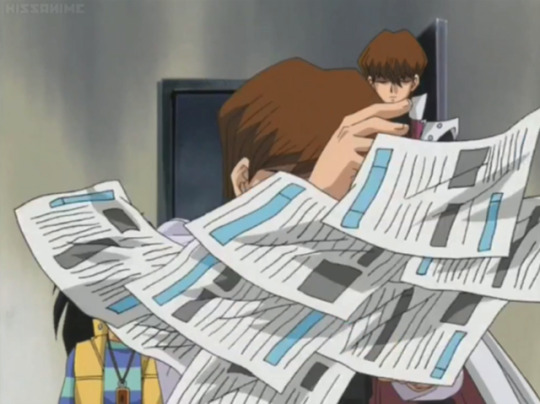

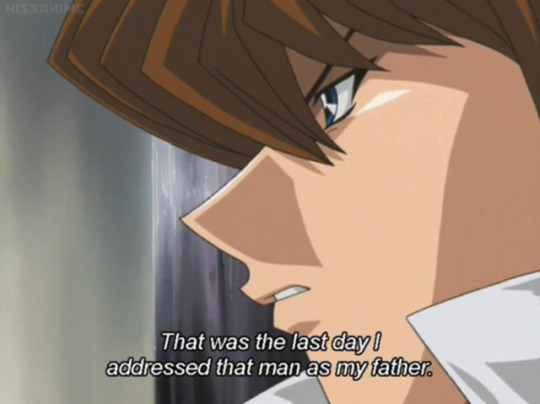
It’s a very stark and strong moment - Seto’s rejection of Gouzaburou, and I think it’s right to take this into account. But I think maybe we should be putting just as much, if not more weight, in the sequences in Noa’s arc following this. Particularly in the structure of Seto and Noa’s duel:


Make no mistake. This is a duel set up to run on Gouzaburou’s terms. Seto and Noa are fighting in the understanding that there’s only one living body between them, and the winner will have proven themselves superior and the rightful heir to Kaiba Corp. They are fighting for the right to Gouzaburou’s legacy, and the loser will be left behind in VR. To Lose is to Die.
Continued under the cut:
Noa believes he has the upper hand, both because he was born and bred for this job. And because he outstripped the boundaries of humanity when his mental capacities were enhanced living in VR.

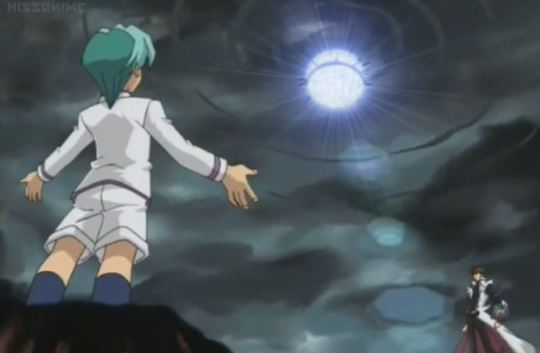
Seto is not impressed with this line of reasoning.

Not only did Seto put in the hard work and struggle to inherit Kaiba Corp. Noa’s already dead. He’s already lost once by Gouzaburou’s terms. Seto accepts the challenge to duel in the understanding that Noa was the loser once, and a loser once is a loser always.
...Both ultimately betray Gouzaburou’s teachings during this duel - Noa by cheating, and Seto by both admitting there are things more important than his own life on the line here in deciding to save Mokuba, and in Atem helping him finish the duel after he’s petrified. (Notably the BC final duel also subverts Seto’s expectations for loss, in Atem’s ability to find a method to save Malik’s life in their shadow game.)
But before that moment of truth, you’ve certainly got a lot of trash talk, some of which seems to betray certain line of reasoning from Seto.


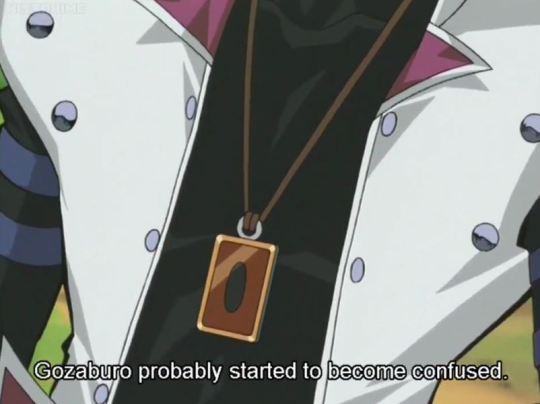
[Insert long speech about the value of humans having to struggle against the chaos of the real world versus this VR of Noa’s creation.]
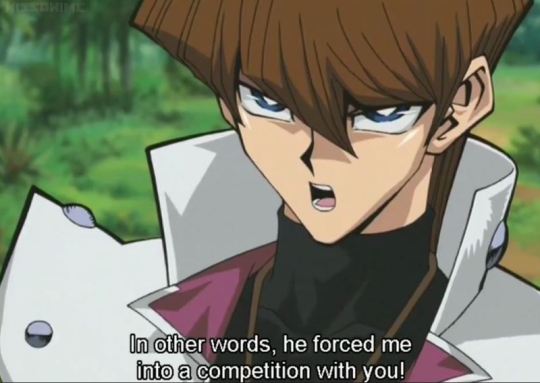

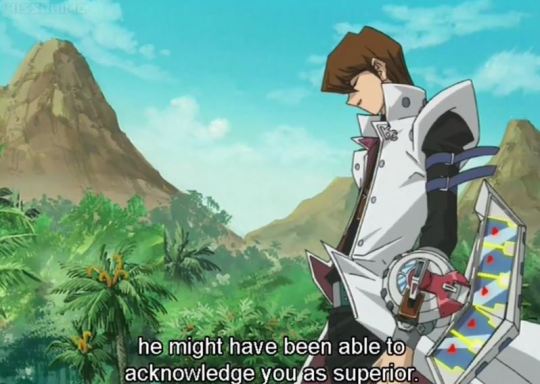
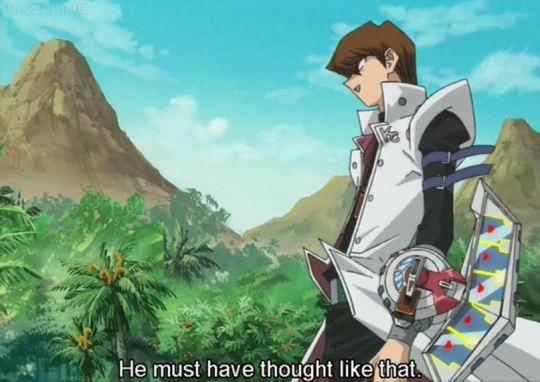



“Of course Gouzaburou loved me more! Gouzaburou must have been confused if he even considered that you might bet the better or superior compared to me! How pathetic of either of you to even doubt! He acknowledged me as superior - and the result of duel is going to prove him right!”
Okay, I’m being hyperbolic but, contrary to what you’d believe from the first set of caps, I think what Seto says here, combined with the circumstances surrounding this duel, betray a certain amount of Seto deeply desiring recognition and acknowledgement from Gouzaburou. Or at least recognition and acknowledgement for having the qualities that Gouzaburou would have valued.
I’ve seen people pan the direction of this arc, and Noa as a villain, specifically on this basis. Seto should, in theory, not care about what Gouzaburou thought, and thus not care about stomping out Noa’s desire to prove himself the worthy son. Gouzaburou was his abuser, no real parent to Seto, and therefore Seto should not care. And, make no mistake, I think Seto’s hatred for his stepfather is clearly documented.
But I’m going to defend how Noa’s arc frames this conflict and Noa as a villain, and the idea that Seto may have feelings regarding Gouzaburou that are rooted in a desire for acknowledgement and affection. There is very little of Gouzaburou in manga canon, nothing that would generally suggest Seto having any conflicting fond feelings for him - although I think the fact that Seto continues to make decisions to build and destroy duel towers in the memory of Gouzaburou might be indicative of the fact that he cares a little too much.
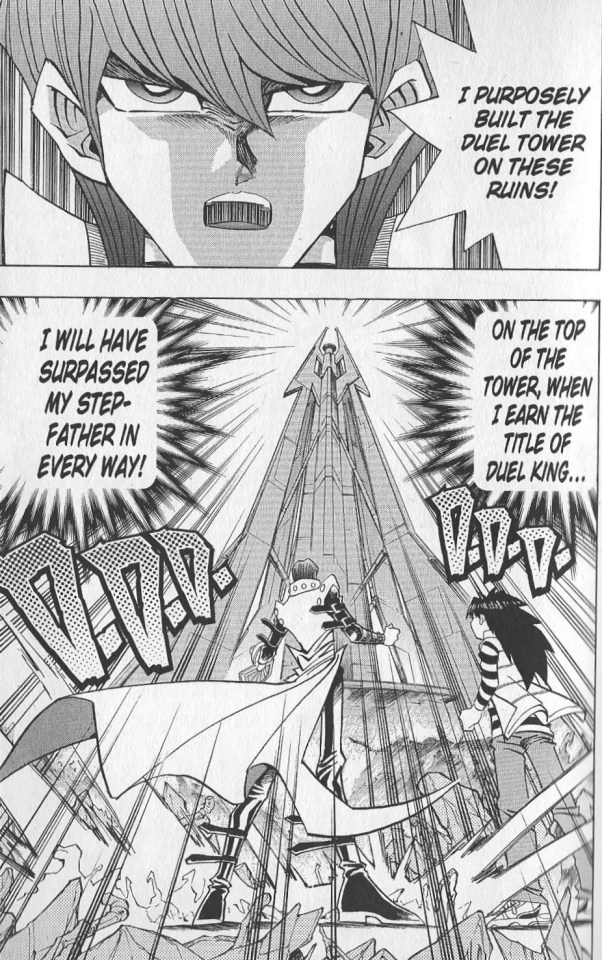
But the reason I think this is a particularly good extrapolation from manga canon, is that it matches the themes we see in REPEATEDLY in the narratives of abuse that ygo offers to us.
I’m sure you’re aware that the surplus of absentee and abusive dads in DM, it’s… a bit of a joke. Even for characters for which you can assume a somewhat normal family life, such as Anzu and Honda, there’s a kind of sense in the story of a lack of presence from their parents. Which I would expect in a manga filled to the brim with ~adventure~ How are the characters gonna pile onto ships and blimps and go traipsing off to Egypt if their parents are always bugging them about school?

Well, I guess Yuugi has somehow managed to make it onto ships and blimps even with his mom bugging him about school…
There are multiple layers to this – The fact that absentee dads have become a norm in Japan given the increasing demands of corporate life. The fact that in a measure of personal experience a dead parent is much the same as an absent one – but dead parents make for better narrative drama. The fact that we never see Atem and his father together and are instead relayed an inherently biased posthumous recollection of their relationship. And the fact that there’s a kind of woefully imbalanced attribution of certain roles onto certain demographics of character. On that last point – I think it’s telling that, as a whole, it’s elder male children that are victimised in Takahashi’s narratives of family. It’s telling that mothers have an even smaller presence in Yu-Gi-Oh than fathers (and that when Yuugi’s mom hits him with a ladle up there, it’s framed as a joke). And it’s telling that father-daughter relationships are also very poorly defined. I’m going to give Shizuka a pass given the discrepancy in hers and Katsuya’s living situations, but I think it’s a pretty huge oversight that Isis’s relationship with her father is as unexplored as it is. (If I’m being brutally honest, I don’t think Takahashi empathises enough with his female characters to understand how they might, also, be deeply unhinged or affected by trauma.)
But, although I can critique the way Takahashi repeatedly approaches this same narrative – the narrative of a young man at odds with a cruel, violent, and single-minded father – I can’t help but love it, as I am perpetually surprised and enamoured with the amount of understanding, empathy, and realism Takahashi allows to his victims. This cuts in a lot of different ways, but there is one aspect that I particularly appreciate:
He not only understands that it’s normal for abused children to be angry and vengeful, but that it’s also normal for them to care about their parents regardless and to desire reconciliation with them, no matter how unlikely or misguided. And they are not shamed for it.
--
Jounouchi ended up being the prototype for this character in ygo canon, although these threads were dropped by the time the card game started. We see the gang caught of guard by an attack meant for Jounouchi.

And Honda confirms this behaviour is typical of Jounouchi’s dad.
But when we see Jounouchi’s attitude towards his dad, it’s warm and full of forgiveness. He enters a game show with the intention of winning money to pay off his father’s debts-

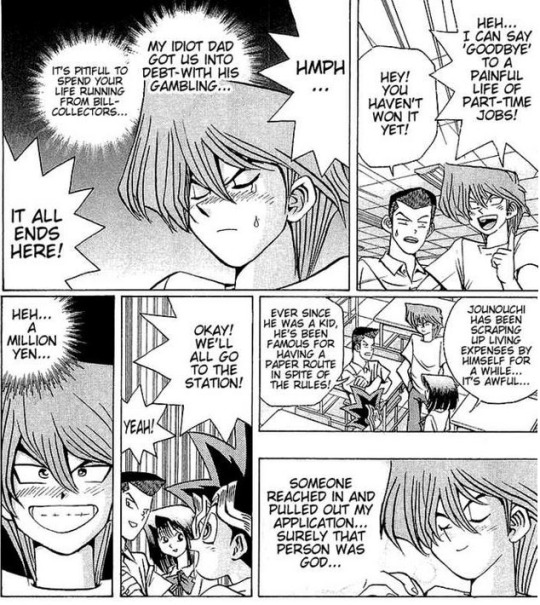

-specifically on the hopes that, by winning, he’ll be able to repair their relationship, and live together happily.
--
Gouzaburou was introduced next into the narrative, but Otogi and his father followed not far after.

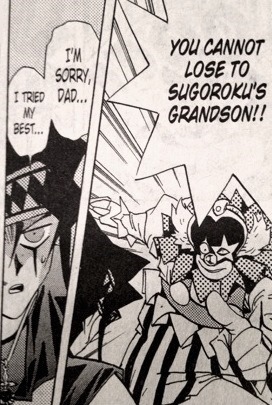
Otogi’s father, Mr Clown, hits and berates him.

But, even so, Otogi continues to seek revenge on his father’s behalf.

And, beyond that, he’s very mild and apologetic.
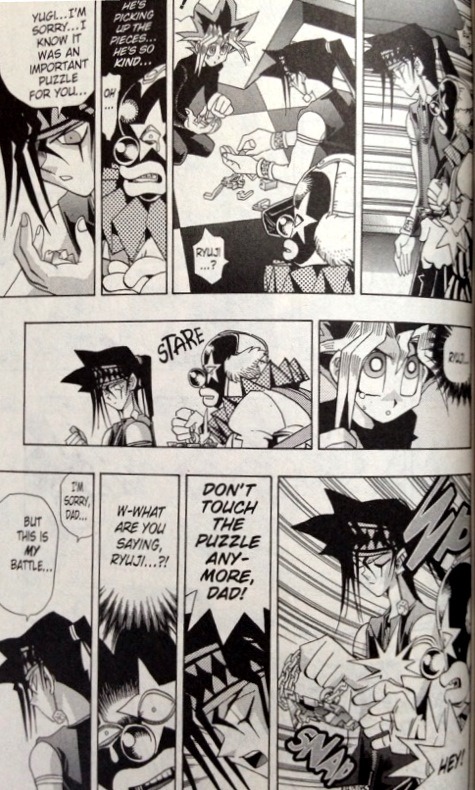
Even when he’s pushing back against his dad, he’s apologising. This is framed as a harsh moment of rebellion - one that shocks Mr Clown - but all Otogi does is disobey his father’s request, and snatch the puzzle’s chain from his hand. And he’s still apologising while doing so. I think it goes to show how uncharacteristic it is for Otogi to express any harshness towards his father.

And, even when Mr Clown renounces Otogi as his son-

We see Otogi afterwards (on Jounouchi’s urging) hurry to cradle his father in his arms and and lead him to safety, and away from the fire that’s started in the Black Clown game shop.
But maybe the most persuasive show of Otogi’s desire to reconcile with his dad, is that he succeeds. They seem to be on good terms in Darkside of Dimensions, have opened a new business at the shopping plaza together.

--
I think Malik embodies this pattern most completely though. His abuse is portrayed with imagery more gruesome than the other characters on this list. His father’s whip, and the scars that were carved onto his back.
I’ve seen people operate under the impression his beef with the Pharaoh has to do with being confined to life underground, or having his back mutilated as part of the tombkeeper ritual, or for twisting his father’s personality into something terrible. I’m not going to say that those could not also be factors in Malik’s motivations. But the primary motivation for his behaviour in BC, is textually that he believes the Pharaoh’s spirit is responsible for killing the father that he loved. And being unable to accept the fact that the father he loved was also the father he hated enough to kill himself.
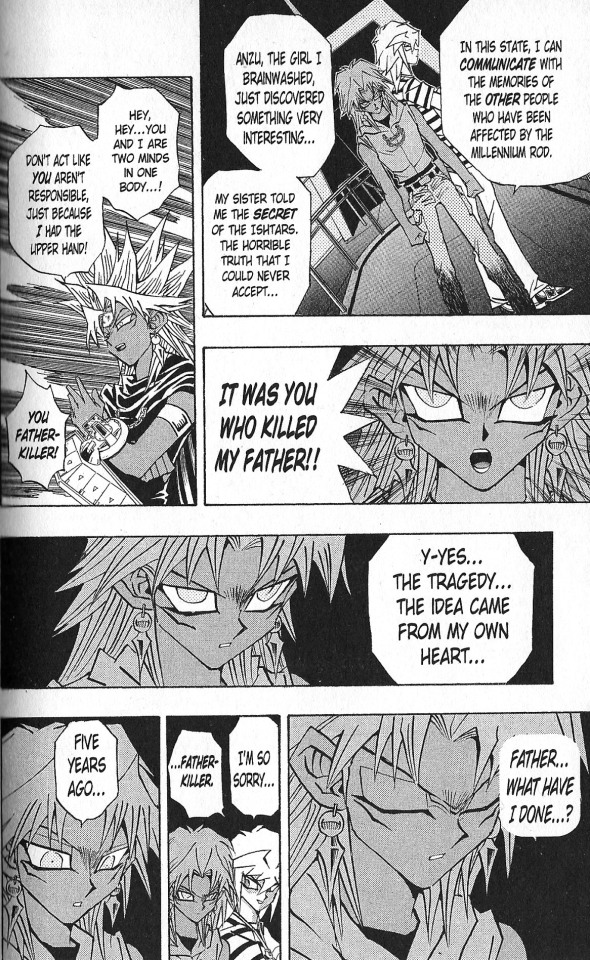

(Also, wow, panels that make much more sense after DSoD. If Bakura was surprised because Shada reappeared despite having been killed 3000 years ago, why was he not surprised to see modern incarnations of Isis and Set. Except in addition to killing Shada, he also killed Shadi ~5 years ago. Now his surprise makes sense.)
But, yeah, this vein is carried through to the end of Malik’s story arc. He’s not able to forgive himself for killing his father, no matter how abusive or terrible, he’s only able to decide, with encouragement from Rishid, that it’s preferable to keep on living.
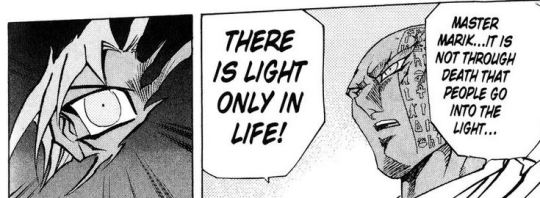

Anyhow, insofar as Seto goes, as I’ve said, there’s scant evidence to draw from regarding his feelings about Gouzaburou. But I think it’s prudent to consider, as with the rest of these characters, his feelings are probably not limited to disdain. According to Takahashi’s commentary, Seto does consider Gouzaburou a father and is has been deeply haunted by his involvement in Gouzaburou’s downfall and death. Taking it a step further, it’s entirely likely that, he feels some form of fondness for his lost parent. No matter how misguided and futile such feelings would be.
#Kaiba Seto#Kaiba Noa#Jounouchi Katsuya#Otogi Ryuuji#Malik Ishtar#Kaiba Gouzaburou#Hank Ishtar#why is my tag for malik's dad 'hank ishtar' it's undermining how overly gd serious this post is#meta#DeLurk words the meta#save me from this card game hell#cw: abuse#i pulled these caps from here and there and everywhere#the Otogi ones I took pictures of myself which is why they're so bad#but thanks again @nenya for getting me the ones for the YBakura & YMalik duel and of Seto in front of the duel tower#i'm so sick of this post. i refuse to look at it any longer.#*sends out for other ppl to look at instead*
202 notes
·
View notes